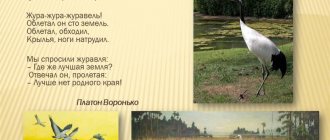Week "International Women's Day"
Goal: Organize all types of children's activities around the theme of family, love for mother, grandmother. To cultivate respect for educators, expand gender perceptions, and involve children in making gifts for mother and grandmother. Continue to cultivate a caring attitude towards those closest to you.
Final event : Matinee for March 8th, presentation of gifts to mothers and grandmothers, exhibition of children's works on the topic.
| Educational area | GCD | Topic of classes | Tasks | Contents (form of work) | Corrective work |
| Cognitive Development | FEMP | Lesson No. 1, 2 1-pages 125-128. | -Continue to teach how to independently compose and solve arithmetic problems within 10. -Continue to develop the ability to determine time using a clock with an accuracy of 1 hour. -Continue to develop the ability to navigate on a sheet of squared paper. -Continue to cultivate independence and attention. | -d/i -Dialogue. - Guessing riddles - Physical exercise. -Discussion. -Solution. | -Development of general and fine motor skills, spatial orientation. -Coordination of speech and movement. Articulation and breathing exercises. -Gymnastics after sleep. |
| Cognitive - research activities | "Plastic" | Introduce children to the artificial material plastic. -Continue to teach how to use various methods of examining objects -Continue to teach how to highlight several qualities of objects in the process of perception -Continue to develop cognitive and research interest -Continue to develop vision, touch, and sensorimotor abilities. -Continue to develop curiosity, attention, thinking. -Continue to cultivate a caring attitude towards things. | -Guessing riddles -Solving a problem situation -Experimenting -Conversation -D/I -Experiments. | ||
| The world | "Mom's work" | Instill in children a kind, attentive attitude towards the closest dear person - their mother. -Continue to develop children's awareness of areas of human activity. -Continue to develop ideas about the work of adults, about the significance of their work for society. -Continue to develop the dialogical form of speech and children’s vocabulary. -Continue psychophysical qualities (dexterity, speed), ability to navigate in space. -Continue to cultivate respect for mother’s work both at work and at home. | -Guessing riddles -Conversation -Looking at illustrations -Reading fiction. -D/I “What is needed for work”, “Find an extra object” -Musical game -Situational conversation. | ||
| Natural world | “How March and February quarreled” | Teach children to notice spring changes in nature - Teach to generalize and systematize children’s ideas about the seasons, create an album about the seasons. -Develop ideas about spring changes in nature. -Continue to develop children’s ideas that everything in nature is interconnected. -Continue to develop the dialogical form of children’s speech and children’s vocabulary. -Continue to cultivate interest and love for nature. | -Conversation -Reading poems, proverbs about spring -Observation -Guessing riddles -Listening to music. | ||
| Speech development | Speech development | Coherent speech. “Shaggy and Winged” 9-page 70. | -Continue the development of dialogic and monologue forms of speech. -Continue to develop the ability to conduct a dialogue between the teacher and the child. -Continue to teach how to be a friendly and correct interlocutor. -Continue to develop the ability to write stories about animals. -Continue to develop the ability to draw up a story plan and stick to it. -Continue to cultivate a culture of verbal communication. | -Conversation -Situational conversation -Dialogue -Composition of a story. | |
| Preparation for literacy | The sound [zh] and the letter Zhzh. | - Continue to learn how to form words from syllables - Continue to learn how to isolate the sequence of sounds in simple words - Continue to develop the ability to compose sentences. -Continue the development of phonemic hearing: determine the place of sound in words -Continue the development of the dialogical form of speech of children -Continue the development of fine motor skills of the fingers -Continue to cultivate a culture of verbal communication | -Situational conversation -D/games -D/exercise. -Game situations -Conversation -Phys. minutes. | ||
| Social and communicative development | Socialization | Safe behavior in nature. Conversation: “A frozen river is not an ice rink at all.” | -Continue to teach the rules of behavior in nature -Introduce children to the rules of behavior on ice -Continue to develop ideas about the properties of ice -Continue to develop the dialogic form of speech | -Conversation -Guessing riddles -Looking at illustrations -Experimenting -Solving a problem situation -Modeling -Physical exercises. | |
| Artistic and aesthetic development | Drawing | “Portrait of Mom” (object drawing) | -Continue to develop the ability to depict an object from memory -Continue to develop the ability to notice the characteristic features of the depicted object. -Continue to develop image technique, freedom and at the same time accuracy of hand movements under visual control, their smoothness, rhythm. -Continue to develop the ability to combine different materials in one drawing to create an expressive image. -Continue to develop fine motor skills of the fingers. -Continue to cultivate a sense of love and respect for the mother through communication with works of art. | -Conversation -Looking at portraits of artists and poets -Reading artistic literature. -D/I “Name it affectionately”, “Name the parts of the head” -Experiments with paints | |
| Application | "Vase with Flowers" | -Continue to learn how to create object images based on idea -Continue to develop a sense of composition (learn to beautifully arrange figures on a sheet of paper of a format corresponding to the proportions of the depicted objects. -Continue to develop techniques for cutting out symmetrical objects from paper folded in half. -Continue to develop the ability to use different techniques for gluing images -Continue to develop a sense of color, flavor, composition. -Continue to develop fine motor skills of the fingers. -Continue to develop the ability to prepare materials and aids for class independently and in a timely manner, to clean your workplace without being reminded. -Continue to cultivate independence, the ability to complete the work started to end. | -Conversation -Looking at illustrations -D/I -Reading fiction -Guessing riddles -Making riddles -Demonstration | ||
| Construction | “Basket for Mom” (online resource) | -Continue to teach children to select colors and their shades when making souvenirs -Continue to teach children to use paper of different textures, make markings using a template -Develop an understanding of Russian public holidays - “March 8th is International Women’s Day” -Continue to develop the dialogical form of children’s speech -Continue to develop fine motor skills of the fingers -Continue to cultivate neatness, a feeling of love and respect for the closest and dearest person - mother | -Conversation -Reading a poem -Reading a story -Workshop for making a children's activity product. | ||
| Physical development | FISO | Lesson 33, 6-page Lesson 34, 6-page 65 | Practice walking in a column one at a time while performing an attention task, crawling on all fours between objects; repeat balance and jumping exercises. | Crawling on all fours between objects without touching them. Walking around the gym. bench with clapping in front of you and behind you for every step. Jumping from hoop to hoop, without pausing, using arm swings. P/game "Blind Man's Bluff". | |
| FISO (STREET) | Lesson 36, 6-page 66 | Practice walking and running while completing the “Find your color” task; repeat the game task with throwing snowballs and jumping. | Game exercises: “Don’t get caught.” Game "Polar Bears". |
March
Week Theme “Maslenitsa”
Goal: Introducing children to the origins of Russian culture, introducing children to folk traditions and customs, expanding their understanding of the art, traditions, and customs of the peoples of Russia. Continue to introduce children to folk songs and dances.
Working with parents: Mobile folder for parents “The History of Maslenitsa”, creation of a “Book of Pancake Recipes”
| Educational area | GCD | Topic of classes | Tasks | Contents (form of work) | Corrective work |
| Cognitive Development | FEMP | Holiday (March 7) | -Development of general and fine motor skills, spatial orientation. -Coordination of speech and movement. Articulation and breathing exercises. -Gymnastics after sleep. | ||
| Cognitive - research activities | "Mirror Experience" | -Continue to develop cognitive and research interest. -Continue to teach children to participate in simple experiments. -Continue to develop vision and sensorimotor abilities. -Continue to develop hand-eye coordination. | -Conversation -Experimentation -Observation -D/I | ||
| The world | Holiday (March 8) | ||||
| Natural world | "Reptiles" | -Develop children's knowledge about reptiles. -Develop ideas about some forms of protection of reptiles from enemies. -Continue to develop children's ideas about the peculiarities of adaptation of animals to the environment -Continue to teach how to establish cause-and-effect relationships between natural phenomena. -Continue to introduce the Red Book, with individual representatives of the class of reptiles listed in it -Continue to cultivate a caring attitude towards the animal world. | -Conversation -Reading fiction -Guessing riddles -D/I -Solving a problem situation -Physical exercise. | ||
| Speech development | Speech development | Learning the chants “Like Mardi Gras...” | -Continue to develop dialogic and monologue forms of speech -Continue to develop the ability to conduct dialogue between the teacher and the child, between children -Continue to teach how to practice intonation expressiveness of speech. -Continue to teach children to be interested in the meaning of words -Continue to develop interest in fiction. -Continue to cultivate a love for oral folk art. | -Conversation -Looking at illustrations -Reading -Discussion -Learning. | |
| Preparation for literacy | Sounds [je] and the letter E. | - Continue to learn how to form words from syllables - Continue to learn how to isolate the sequence of sounds in simple words - Continue to develop the ability to compose sentences. -Continue the development of phonemic hearing: determine the place of sound in words -Continue the development of the dialogical form of speech of children -Continue the development of fine motor skills of the fingers -Continue to cultivate a culture of verbal communication | |||
| Social and communicative development | Socialization | Traffic rules “Signs in a triangle” | -Continue to develop knowledge about road traffic -Continue to develop knowledge about road signs -Continue to teach children to understand the need to follow traffic rules -Continue to develop attention, logical thinking -Continue to cultivate a culture of behavior on the street. | -Conversation -Situational conversation -Looking at illustrations of traffic signs -Guessing riddles. | |
| Artistic and aesthetic development | Drawing | "Maslenitsa festivities" | Teach to reflect holiday impressions in a drawing - Continue to teach children to place images on the sheet in accordance with their real location. -Continue to teach how to convey differences in the size of depicted objects -Continue to develop the ability to build the composition of a drawing. -Continue to cultivate respect for folk traditions. | -Conversation -Reading fiction -Looking at illustrations - | |
| Modeling | “Horses are riding to Maslenitsa” (decorative modeling) | -Continue to develop decorative sculpting skills -Continue to teach how to use different sculpting methods -Teach to convey the characteristic features of Dymkovo animals, their poses, sculpt legs and torso from one piece, head and neck from another -Continue to develop children's creativity. -Continue to develop independence, the ability to prepare materials for class independently and in a timely manner, without being reminded to clean your workplace. | -Conversation -Looking at the album “Dymkovo Toys” -Guessing riddles -Demonstration -Doing work. | ||
| Construction | “Oil Can Doll” (working with fabric) | -Teach children practical skills to work with material -Develop interest in folk culture and folk traditions. -Continue to develop fine motor skills of the hands -Continue to develop interest in folk toys, accuracy, and hard work. | -Conversation “Toys from the Past” -Looking at the album “In the Toy Museum” -Reading proverbs and sayings about work -Listening to Russian folk songs. | ||
| Physical development | FISO | Lesson 1, 6-page Lesson 2, 6-page 72 | Exercise children in walking and running between objects; in maintaining balance when walking on increased support with an additional task; repeat the task in jumping, relay race with the ball. | Equilibrium. Jumping. Relay race with the ball “Passing the ball in a line.” P/game "Keys". | |
| FISO (STREET) | Lesson 3,6-page 73 | Repeat speed running exercises, game tasks with jumping and ball | Game exercises: “Frogs in the swamp”, “Ball against the wall”. Game "Owl". |
March



